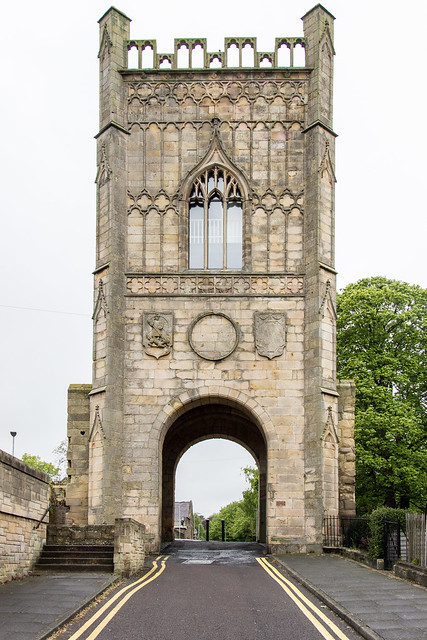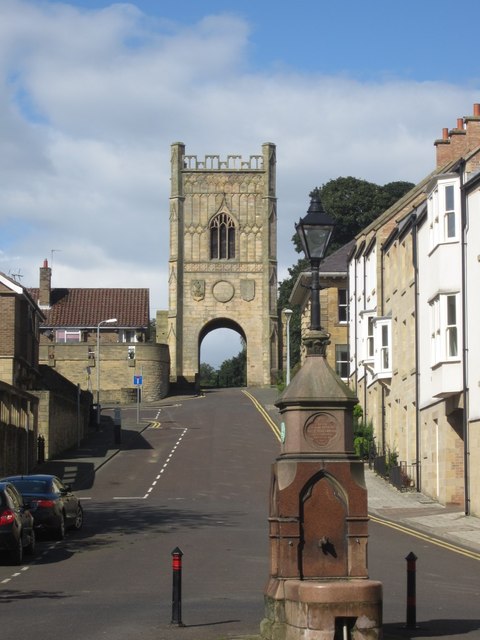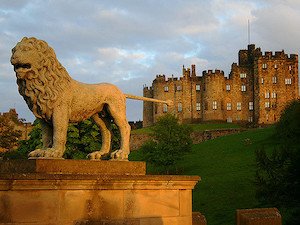Pottergate Tower, Alnwick, England

-
Description
Grade II* listed historic town gate, part of the town's original defenses, rebuilt in 1768. It had a spire, but it was removed in 1812. "Alnwick (/ˈænɪk/ AN-ik) is a market town in Northumberland, England, of which it is the traditional county town. The population at the 2011 Census was 8,116. The town is on the south bank of the River Aln, 32 miles (51 km) south of Berwick-upon-Tweed and the Scottish border, 5 miles (8 km) inland from the North Sea at Alnmouth and 34 miles (55 km) north of Newcastle upon Tyne. The town dates to about ad 600, and thrived as an agricultural centre. Alnwick Castle was the home of the most powerful medieval northern baronial family, the Earls of Northumberland. It was a staging post on the Great North Road between Edinburgh and London, and latterly has become a dormitory town for nearby Newcastle-upon-Tyne. The town centre has changed relatively little, but the town has seen some growth, with several housing estates covering what had been pasture, and new factory and trading estate developments along the roads to the south. The name Alnwick comes from the Old English wic ('dairy farm, settlement') and the name of the river Aln. The history of Alnwick is the history of the castle and its lords, starting with Gilbert Tyson, written variously as "Tison", "Tisson", and "De Tesson", one of William the Conqueror's standard bearers, upon whom this northern estate was bestowed. It was held by the De Vesci family (now spelt "Vasey" – a name found all over south-east Northumberland) for over 200 years, and then passed into the hands of the house of Percy in 1309. At various points in the town are memorials of the constant wars between Percys and Scots, in which so many Percys spent the greater part of their lives. A cross near Broomhouse Hill across the river from the castle marks the spot where Malcolm III of Scotland was killed during the first Battle of Alnwick. At the side of the broad shady road called Ratten Row, leading from the West Lodge to Bailiffgate, a stone tablet marks the spot where William the Lion of Scotland was captured during the second Battle of Alnwick (1174) by a party of about 400 mounted knights, led by Ranulf de Glanvill. Hulne Priory, outside the town walls in Hulne Park, the Duke of Northumberland's walled estate, was a monastery founded in the 13th century by the Carmelites; it is said that the site was chosen for some slight resemblance to Mount Carmel where the order originated. Substantial ruins remain. In 1314, Sir John Felton was governor of Alnwick. In winter 1424, much of the town was burnt by a Scottish raiding party. Again in 1448 the town was burnt by a Scottish army led by William Douglas, 8th Earl of Douglas and George Douglas, 4th Earl of Angus. There was a Church of Scotland congregation in Alnwick in the 17th and 18th centuries. Thomas Malory mentions Alnwick as a possible location for Lancelot's castle Joyous Garde. An Royal Air Force distribution depot was constructed at Alnwick during the Second World War war with four main fuel storage tanks (total capacity 1700 tons), and road and rail loading facilities. The tanks were above ground and surrounded with concrete. The site was closed in the 1970s and its demolition and disposal was completed in 1980. The Alnwick by-pass takes the A1 London–Edinburgh trunk road around the town. It was started in 1968." - info from Wikipedia. Summer 2019 I did a solo cycling tour across Europe through 12 countries over the course of 3 months. I began my adventure in Edinburgh, Scotland and finished in Florence, Italy cycling 8,816 km. During my trip I took 47,000 photos. Now on https://www.instagram.com/billyd.wilson/" rel="noreferrer nofollow">Instagram. Become a patron to my photography on https://www.patreon.com/billywilson" rel="noreferrer nofollow">Patreon. -
Owner
Billy Wilson Photography -
Source
Flickr (Flickr) -
License
What does this mean? Attribution-NonCommercial License
-
Further information
Link: https://www.flickr.com/photos/32132568@N06/49986306098/
Resource type: Image
Added by: Simon Cotterill
Last modified: 3 years, 6 months ago
Viewed: 830 times
Picture Taken: 2019-05-18T12:17:22 -
Co-Curate tags




